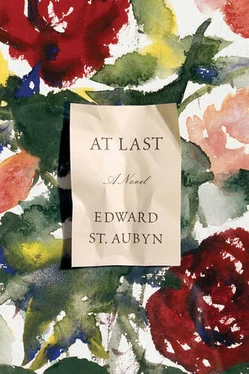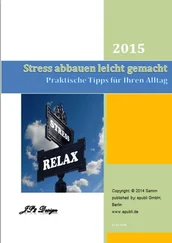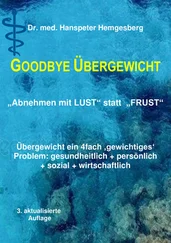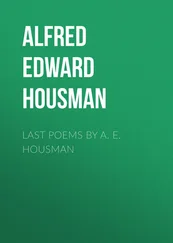‘Thank you for coming,’ said Mary.
‘Not at all,’ mumbled Erasmus, and after squeezing Mary’s shoulder lightly, he left without saying goodbye to anyone else.
‘Don’t worry,’ said Fleur to Patrick, ‘I’ll follow him at a discreet distance.’
‘You’re his guardian angel,’ said Patrick, struggling to disguise his relief at getting rid of Fleur so easily.
Mary followed Fleur politely onto the landing.
‘I haven’t got time to chat,’ said Fleur, ‘that poor man’s life is in danger.’
Mary knew better than to contradict a woman of Fleur’s strong convictions. ‘Well, it’s been a pleasure to meet such an old friend of Eleanor’s.’
‘I’m sure she’s guiding me,’ said Fleur. ‘I can feel the connection. She was a saint; she’ll show me how to help him.’
‘Oh, good,’ said Mary.
‘God bless you,’ Fleur called out as she set off down the stairs at a cracking pace, determined not to lose track of Erasmus’s suicidal progress through the streets of London.
‘What a woman!’ said Johnny, watching through the doorway as Fleur left. ‘I can’t help feeling that somebody should be following her rather than the other way round.’
‘Count me out,’ said Patrick, ‘I’ve had an overdose of Fleur. It’s a wonder she was ever allowed out of the Priory.’
‘She looks to me as if she’s just at the beginning of a manic episode,’ said Johnny. ‘I imagine she was enjoying it too much and decided not to take her pills.’
‘Well, let’s hope she changes her mind before she “saves” Erasmus,’ said Patrick. ‘He might not survive if she rugby tackles him on a bridge, or leaps on him while he’s trying to cross the road.’
‘God!’ said Mary, laughing with relief and amazement. ‘I wasn’t sure she was ever going to leave. I hope Erasmus made it round the corner before she got outside.’
‘I’m going to have to leave myself,’ said Johnny. ‘I’ve got a patient at four o’clock.’
He said goodbye to everyone, kissing Mary, hugging the boys, and promising to call Patrick later.
Suddenly the family was alone, apart from the waitress, who was clearing up the glasses and putting the unopened bottles back into a cardboard box in the corner.
Patrick felt a familiar combination of intimacy and desolation, being together and knowing they were about to part.
‘Are you coming back with us?’ asked Thomas.
‘No,’ said Patrick, ‘I have to go and work.’
‘Please,’ said Thomas, ‘I want you to tell me a story like you used to.’
‘I’ll see you at the weekend,’ said Patrick.
Robert stood by, knowing more than his brother but not enough to understand.
‘You can come and have dinner with us if you like,’ said Mary.
Patrick wanted to accept and wanted to refuse, wanted to be alone and wanted company, wanted to be close to Mary and to get away from her, wanted the lovely waitress to think that he led an independent life and wanted his children to feel that they were part of a harmonious family.
‘I think I’ll just…crash out,’ he said, buried under the debris of contradictions and doomed to regret any choice he made. ‘It’s been a long day.’
‘Don’t worry if you change your mind,’ said Mary.
‘In fact,’ said Thomas, ‘you should change your mind, because that’s what it’s for!’
As he laboured up to his bedsit, a miniature roof conversion with sloping walls on the fifth floor of a narrow Victorian building in Kensington, Patrick seemed to regress through evolutionary history, growing more stooped with each flight, until he was resting his knuckles on the carpet of the top landing, like an early hominid that has not yet learned to stand upright on the grasslands of Africa and only makes rare and nervous expeditions down from the safety of the trees.
‘Fuck,’ he muttered, as he got his breath back and raised himself to the level of the keyhole.
It was out of the question to invite that adorable waitress back to his hovel, although her telephone number was nestling in his pocket, next to his disturbingly thumping heart. She was too young to have to squeeze herself out from under the corpse of a middle-aged man who had died in the midst of trying to justify her wearisome climb to his inadequate flat. Patrick collapsed onto the bed and embraced a pillow, imagining its tired feathers and yellowing pillowcase transformed into her smooth warm neck. The anxious aphrodisiac of a recent death; the long gallery of substitutes substituting for substitutes; the tantalizing thirst for consolation: it was all so familiar, but he reminded himself grimly that he had come back to his non-home, now that he was alone at last, in order to be unconsoled. This flat, the bachelor pad of a nonbachelor, the student digs of a non-student, was as good a place as he could wish for to practise being unconsoled. The lifelong tension between dependency and independence, between home and adventure, could only be resolved by being at home everywhere, by learning to cast an equal gaze on the raging self-importance of each mood and incident. He had some way to go. He only had to run out of his favourite bath oil to feel like taking a sledgehammer to the bath and begging a doctor for a Valium script.
Nevertheless, he lay on the bed and thought about how determined he was: a Tomahawk whistling through the woods and thudding into its target, a flash of nuclear light dissolving a circle of cloud for miles around. With a groan he rolled slowly off the bed and sank into the black armchair next to the fireplace. Through the window on the other side of the flat he could see slate roofs sloping down the hill, the spinning metal chimney vents glinting in the late-afternoon sun and, in the distance, the trees in Holland Park, their leaves still too tight-fisted to make their branches green. Before he rang the waitress — he took out the note and found that she was called Helene — before he rang Mary, before he went out for a long sedative dinner and tried to read a serious book, under the dim lighting and over the maddening music, before he pretended that he thought it was important to keep up with current affairs and switched on the news, before he rented a violent movie, or jerked off in the bath because he couldn’t face ringing Helene after all, he was going to sit in this chair for a while and show a little respect for the pressures and intimations of the day.
What exactly had he been mourning? Not his mother’s death — that was mainly a relief. Not her life, he had mourned her suffering and frustration years ago when she started her decline into dementia. Nor was it his relationship with her, which he had long regarded as an effect on his personality rather than a transaction with another person. The pressure he had felt today was something like the presence of infancy, something far deeper and more helpless than his murderous relationship with his father. Although his father had been there with his rages and his scalpels, and his mother had been there with her exhaustion and her gin, this experience could not be described as a narrative or a set of relationships, but existed as a deep core of inarticulacy. For a man who had tried to talk his way out of everything he had thought and felt, it was shocking to find that there was something huge that he had failed to mention at all. Perhaps this was what he really had in common with his mother, a core of inarticulacy, magnified in her case by illness, but in his case hidden until he heard the news of her death. It was like a collision in the dark in a strange room; he was groping his way round something he couldn’t remember being there when the lights went out. Mourning was not the word for this experience. He felt frightened but also excited. In the post-parental realm perhaps he could understand his conditioning as a single fact, without any further interest in its genealogy, not because the historical perspective was untrue, but because it had been renounced. Someone else might achieve this kind of truce before their parents died, but his own parents had been such enormous obstructions that he had to be rid of them in the most literal sense before he could imagine his personality becoming the transparent medium he longed for it to be.
Читать дальше












